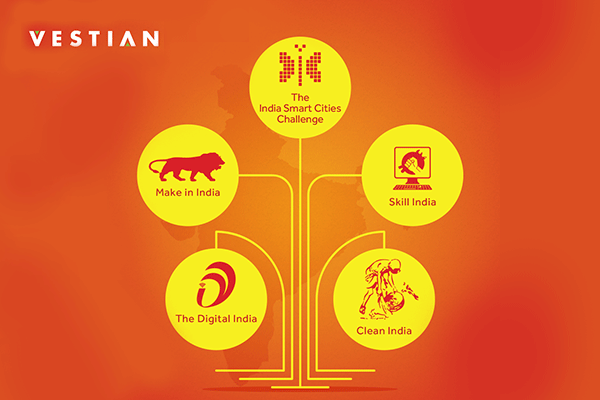4th article in the series focuses on Government initiatives and funding of Smart Cities in India
The objective of the smart city mission is to promote cities that provide core infrastructure, decent quality of life, clean & sustainable environment and include application of ‘smart solutions’. Government has come up with various initiatives to support the Smart City program.
Government Initiatives Related to the Program
The India Smart Cities Challenge is a competition to inspire greater creativity from municipal officials & their partners and involves public participation in the development of proposals. The Ministry of Urban Development (MoUD) designed this initiative with Bloomberg Philanthropies in early 2015 to advance urban development in the country. This is the first time that the Government has adopted a competitive framework to allocate funding and produce concrete benefits in peoples’ lives. The primary idea lies in engaging citizens from the participating cities with urban specialists, global architects and planners for knowledge sharing seminars on innovative technologies. It helps in propagating ideas, establishing an interpersonal connect with the respective Smart City development, and also in realizing individual responsibilities towards its sustenance.
Make in India is a major national initiative designed to encourage multi-national and domestic companies manufacture their products indigenously. It aims to make India a global manufacturing hub as well as generate employment opportunities within the country. Apart from increasing GDP & tax revenues; fostering innovation, protecting intellectual property, and enhancing skill development can be achieved through this program.
Similarly, Skill India is another campaign launched by the Government of India with an aim to provide training and skill development to 500 million youth of the country by 2022. Exposure to latest technology and industrial amenities will help the nation synthesize its requirements within the country and minimize the need for outsourcing work. Various initiatives of the government like National Skill Development Mission, National Policy for Skill Development and Entrepreneurship 2015, Pradhan Mantri Kaushal Vikas Yojana (PMKVY) and the Skill Loan scheme are other such initiatives in this direction.
The Digital India initiative launched last year is intended to empower and make information on health, education, labor and employment, commerce, etc. accessible to all. Under this programme, the government plans to introduce Broadband Highways, Universal Access to Mobile Connectivity, Public Internet Access Programme, IT for Jobs and much more. The Ministry of Communications and IT has devised various bi-programs that form a part of Digital India initiative such as- Digi Locker, MyGov.in, eSign Framework, eHospital, Digitize India Platform, Bharat Net, Next Generation Network, etc.
In an endeavor to promote cleanliness and improve sanitation, the Clean India (Swachh Bharat) campaign was launched by Government of India nationally. The INR 62,009 crore project, covering 4041 statutory towns across India aims to improve cleanliness and sanitation across the country by October 2, 2019. It is responsible for raising social awareness on sanitary malpractices, introduction of sustainable best practices and motivating healthy best practices amongst citizens.
The Smart Cities Mission involves total spends of INR 1, 44,742 crores for 60 cities. The Cabinet has approved annual spends of INR 48,000 crore towards the five year mission. Initially, each Smart City will be given rupees two crores for preparation of Smart City Proposals (SCPs). This funding is expected to come from the city’s share of Administrative &Office Expense funds. While 198 crores will be given to the selected smart city during the first year for its development, the government will fund 100 crores for the next three years to ensure completion of all pending project works approved for the city. Meanwhile, states and union territories have to match this amount and gather funds via PPP alongside convergence from other schemes such as National Investment and Infrastructure Funds (NIIF), municipal bonds, etc.
INR 81,000 crores required for the first 33 cities will be funded by the respective union & state governments, ULBs and through private funding channels. 60% of the funding from ULBs is expected to come from PPP (public-private partnerships) and land monetization
Smart City Proposals (SCPs). This funding is expected to come from the city’s share of Administrative &Office Expense funds. While 198 crores will be given to the selected smart city during the first year for its development, the government will fund 100 crores for the next three years to ensure completion of all pending project works approved for the city. Meanwhile, states and union territories have to match this amount and gather funds via PPP alongside convergence from other schemes such as National Investment and Infrastructure Funds (NIIF), municipal bonds, etc.
INR 81,000 crores required for the first 33 cities will be funded by the respective union & state governments, ULBs and through private funding channels. 60% of the funding from ULBs is expected to come from PPP (public-private partnerships) and land monetization.
Proposed funding Split

Source: www.smartcitieschallenge.in
The proposed investment for the additional 27 cities amounts to INR 66,883 crores. In this, 79% has been allocated to area-based developments and 21% for pan-city solutions. However, these funds will only be released if the city’s performance reviews on physical & financial progress, milestones achieved are submitted in a timely manner every quarter.
Apart from State & Central Government aids, private & public partnerships; the Smart Cities’ initiative also involves partnerships/ tie-ups with international agencies and Governments.
In the next part, we will look at the various international partnerships involved in the Smart Cities Mission.
